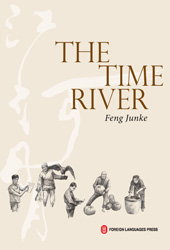| 
Publisher: Foreign Languages Press
Year of publication: 2013
ISBN: 978-7-119-08530-2
Price: 48 yuan
Features:
A collection of succinct sketches of the native soil and a nostalgic symphony of emotional attachment, The Time River, delineated with the liveliest and most unsparing strokes of the pen, reintroduces the unbleached beauty of China's villages, once considered backward, ignorant and rude. In the calm yet powerful narratives of the author, the small villages of central China, along with their inconsequential inhabitants and their simple stories, radiate a vigorous sheen of life and etch themselves into our memory as treasures for us to cherish.
Author Profile:
Feng Junke, born in Wen County, Henan Province, graduated from the Department of Philosophy of Peking University in 1980. He has worked as a researcher, chief of Beijing Municipal Bureau of Press and Publications and Beijing Municipal Copyright Bureau, chairman of Beijing Publication and Distribution Association, and chairman of the Capital Publication and Distribution Alliance. His publications include: Memories Written on the Wall, Past Events That Haven't Gone Far, The Troubles of Being a Celebrity, A Thousand Clean Mountains, How the Emperors Rule, On Happiness in the West, Essays Beneath the Twin Trees, and Straight Talks. His The Time River won the fifth Bingxin Prose Award.
Preface:
By Mo Yan
A collection of succinct sketches of the native soil and a nostalgic symphony of emotional attachment, The Time River, delineated with the liveliest and most unsparing strokes of the pen, reintroduces the unbleached beauty of China's villages, once considered backward, ignorant and rude. In the calm yet powerful narratives of the author, the small villages of central China, along with their inconsequential inhabitants and their simple stories, radiate a vigorous sheen of life and etch themselves into our memory as treasures for us to cherish.
The Time River is not only a collection of fine essays. It is also a literary creation that has made a return to simplicity. From the perspective of a modern city dweller, the author delves directly into the heart of China's native soil with faithfulness and without exaggeration, seeking no moral high ground and avoiding any overstated criticism for its own sake. Exploring the various dimensions of humanity, the author employs traditional sketching techniques just as capably as he manages to illuminate the nature of man through the depths of modern literature.
He serves us with an opportunity to discover the open-minded nature of good Chinese writers, who are confident but not boastful, humble but not self-abasing. They depict the genuine faces of China, the true historical facets of the Chinese and their collective character. A genuine reflection infused with emotion, this work is more than a recollection of the past or a collection of memories relived. It is a creative rediscovery that embodies the author's greatest respect for the period of unforgettable history in which he has immersed himself.
A quality literary work in its own right, The Time River also presents the remarkable progress made in China after the country initiated its development program for rural areas. In this sense the work serves not only as literature, but also as a sample of social observation teeming with vivid detail and sentiment.
Mo Yan, born Guan Moye, is a contemporary Chinese writer. Emerging to prominence in the mid-1980s with Frog, Big Breasts and Wide Hips and other native-soil novels, he won the Nobel Prize for Literature in 2012.
Purchase here:
Tel: +86 10 68996138/68997794
Fax: +86 10 68326642
Email: flprights@163.com |
